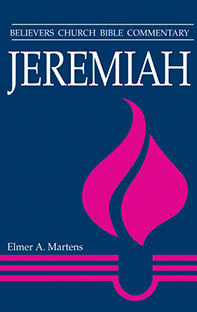Difference between revisions of "Lord of Hosts (in Jeremiah)"
Dougmiller4 (talk | contribs) |
Dougmiller4 (talk | contribs) |
||
| Line 10: | Line 10: | ||
The Lord directs his military power against nations and idols, but also—and here is irony—against his own people. More than 30 times sentences of judgment begin or conclude with the formidable expression “LORD of hosts” (e.g., 11:22; 23:15; 28:16). God’s work is a work of judgment primarily, since of the 82 occurrences of this title in Jeremiah, 50 are associated with judgment (e.g., 6:6; 9:7). Only a dozen times is the title in a redemption context, but even there the combative note is heard (e.g., 30:8; 50:18). | The Lord directs his military power against nations and idols, but also—and here is irony—against his own people. More than 30 times sentences of judgment begin or conclude with the formidable expression “LORD of hosts” (e.g., 11:22; 23:15; 28:16). God’s work is a work of judgment primarily, since of the 82 occurrences of this title in Jeremiah, 50 are associated with judgment (e.g., 6:6; 9:7). Only a dozen times is the title in a redemption context, but even there the combative note is heard (e.g., 30:8; 50:18). | ||
| − | + | == Invitation to Comment == | |
To recommend improvements to this article, [mailto:dougm@tabor.edu click here]. | To recommend improvements to this article, [mailto:dougm@tabor.edu click here]. | ||
Revision as of 03:07, 27 September 2015
![]() Home A B C D E F G H I J K L M N O P Q R S T U V W X Y Z Abbreviations Glossary
Home A B C D E F G H I J K L M N O P Q R S T U V W X Y Z Abbreviations Glossary
A title for God which has royal and military overtones. The “hosts” (ṣeba’ot) refer to Israel’s armies of which the LORD (Yahweh) is the leader (1 Sam 17:45), or heavenly beings such as angels (1 Kings 22:19), or the astral bodies of sun, moon, and stars (Deut 4:19). Yahweh Ṣeba’ot is God’s name, a point made by Amos in a hymn (4:13; 5:27), by Isaiah in a taunt on Babylon (47:4; 48:2), and eight times by Jeremiah (31:35; 10:16; 32:18; 48:15; 50:34; 51:19, 57). In no book is the expression “LORD of hosts” found more often than in Jeremiah. Of 285 occurrences in the Old Testament, 82 are found in Jeremiah.
The “LORD of hosts” is a royal title. It refers to a kingly figure who “dwells between the cherubim” in majesty (1 Sam 4:4; 2 Sam 6:2; cf. Isa 6:2). In ancient times kings were portrayed on thrones with cherubim on either side. This royal aspect, not directly linked to armies, appears in worship psalms, and often in conjunction with Mt. Zion (46:7, 11; 48:8; 84:1, 3, 12).
The title is also a military title, for the addition of “hosts” to the name Yahweh (LORD) underlines his power and combativeness. The aspect of power can be heard in such declarations as: “O great and powerful God, whose name is the LORD of hosts” (32:18; NIV translates “LORD of hosts” as “LORD Almighty”). In Jeremiah the expression “LORD of hosts,” or “LORD of hosts, God of Israel” appears most often in warlike or combative contexts. More than 20 times this weighty title occurs in conjunction with other nations. The LORD of hosts is a total match for every power whether Moab (48:1), Elam (49:35), Ammon (46:25), Edom (49:7), or the larger powers of Egypt (46:10) and Babylon (50:25, 31; 51:57–59). The title is frequent in disputation-type passages, such as Jeremiah 27:17–22.
The Lord directs his military power against nations and idols, but also—and here is irony—against his own people. More than 30 times sentences of judgment begin or conclude with the formidable expression “LORD of hosts” (e.g., 11:22; 23:15; 28:16). God’s work is a work of judgment primarily, since of the 82 occurrences of this title in Jeremiah, 50 are associated with judgment (e.g., 6:6; 9:7). Only a dozen times is the title in a redemption context, but even there the combative note is heard (e.g., 30:8; 50:18).
Invitation to Comment
To recommend improvements to this article, click here.
| —Elmer A. Martens |
